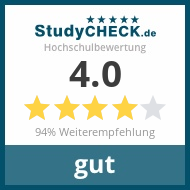Non-Destructive Testing (M.Sc.)
Expert knowledge on an international level
Target Group
- This course is designed for successful graduates, from engineering, materials science, geoscience, applied physics or related fields and also for people who are working already in the NDT field and those who are seeking careers and advanced specialization in mechanical, electrical, and civil engineering, as well as in highly diverse companies in transportation, energy (including nuclear), chemistry, micro- and nanoelectronics, and public safety facilities, and more. The successful completion of the degree entitles the student to work in the research field as well as in practice in industry.
Advantages
Overview of the study contents
Basic modules
- Material Science
- Measurement Techniques
- Mechanics
- Numerical Methods & Signal Processing
- Introduction into NDT & Quality Management
Special Modules
- Acoustic Methods
- Electromagnetic Methods
- Radiological Methods
- Optical Methods
- Thermal & Microscopical Methods
Research Modules
- Basic Course of DGZfP
- Research Internship
Master's Thesis
After finishing these modules the students will complete their master's thesis.
Student voices about the NDT programme
Lecturers
Lukasz Ambrozinski - Department of Robotics and Mechatronics AGH University of Science and Technology, Krakow, Poland
Prof. Dr. Christian Boller -Lehrstuhl für zerstörungsfreie Prüfung und Qualitätssicherung (LZfPQ), Universität des Saarlandes Campus Dudweiler, Saarbrücken, Germany
Dr. Carsten Becker-Willinger -Leibniz-Institut für Neue Materialien gGmbH, Saarbrücken, Germany
Prof. Dr. Gerd Dobmann -Senior Scientific Consultant, Saarbrücken, Germany
Prof. Dr. Uwe Ewert -formerly Bundesanstalt für Materialforschung und –prüfung, Berlin, Germany
Prof. Dr. Philippe Guy -Laboratoire Vibrations Acoustique INSA-Lyon, Villeurbanne, France
Dirk Henn -Fraunhofer-Institut for Non-Destructive Testing IZFP, Saarbrücken, Germany
Prof. Dr. Johann Hinken -FI Test- und Messtechnik GmbH, Magdeburg, Germany
Dr. Ralf Holstein -Managing Director of DGZfP Ausbildung und Training GmbH, Berlin, Germany
Dr. Malgorzata Kopycinska-Müller - Fraunhofer IKTS, Dresden, Germany (Microscopy)
Prof. Dr. Andrzej Klepka -Department of Robotics and Mechatronics AGH University of Science and Technology, Krakow, Poland
Dr. Andreas Kupsch -Bundesanstalt für Materialforschung und –prüfung, Berlin, Germany
Prof. Dr. Christian Kübel - Karlsruhe Institute of Technology (KIT), Karlsruhe, Germany (Microscopy)
Dr. Fabien Léonard -University of Manchester, UK
Prof. Dr. Michael Schuth -Hochschule Trier, Germany
Prof. PD Dr. habil. Peter Starke -Hochschule Kaiserslautern, Germany
Prof. Tadeusz Stepinski -AGH Cracow/Poland (Acoustic Imaging), Krakow, Poland
Prof. Dr. Volker Trappe -Bundesanstalt für Materialforschung und –prüfung, Berlin, Germany
Prof. Frank Walther -TU Dortmund University, Dortmund, Germany
Dr. Mathias Ziegler -Bundesanstalt für Materialforschung und –prüfung, Berlin, Germany
Dr. Uwe Zscherpel - Bundesanstalt für Materialforschung und -prüfung, Berlin, Germany
Admission requirements
- Master’s / Bachelor’s Degree (4 years or 180 credit points) preferably in mechanical engineering, electrical engineering, civil engineering, material sciences , geological science, applied physics as well as related subjects
- Proficiency in English language (level IELTS 6.0, TOEFL iBT79)
- Practical experience in non-destructive testing (NDT) or even destructive testing is advantageous
Scholarship Information
- Various kinds of DAAD funding for foreign students, graduates and postdocs as well as on funding offered by other selected organisations
- IAEA Scholarship up tp 20,000 €: IAEA (Internat. Atomic Energy Agency) has been offering again the IAEA Marie Sklodowska-Curie Fellowship (MSCF) for which suitable female candidates can apply.
Since 14th of July, 2023 the IAEA (Internat. Atomic Energy Agency) has been offering again the IAEA Marie Sklodowska-Curie Fellowship (MSCF) for which suitable female candidates can apply. The aim of the programme is to increase the number of women in the field of nuclear engineering. Selected students will receive a scholarship to pursue master's degrees in nuclear-related programmes at accredited universities. There is also the opportunity to complete an internship of up to 12 months arranged by the IAEA. DIU's NDT master´s programme will be definitely considered for the scholarship, which is an excellent opportunity for young women to become part of our NDT programme, work in an exciting field of application and target towards a professional career at international level.
Students are awarded up to €20,000 for tuition costs and up to €20,000 for living costs for the master’s programme for the academic years 2023/24 and 2024/2025. Therefore, take a close look at the site and take the chance applying for it. Further information can be found on the following webpage: Homepage der IAEA für das MSCF-Programm.
The deadline for applications is 30.09.2024.
More information: Please contact Caroline Heller (DIU Study Advisory) via mail studyadvisory@di-uni.de
Kompakt
- Degree:
- Master of Science (M.Sc.)
- Place of study:
- Dresden and Online
- Start of study:
- 01. October 2024
- Duration:
- 4 semesters
- Credit points:
- 120 points
- program type:
- full time
- Tuition fee:
- 895 € per month
- FINANCING AVAILABLE
Personal advice
Personal advice
by our Indian Country Manager
Personal advice
by our Iran Country Manager
flexible learning
The lectures take place for the most part in presence and online. Study materials are made available to students to enable asynchronous self-organized learning. Lecture-free period phases during the summer and Christmas periods.
in-depth expert knowledge
The team of lecturers in the program includes both top-class scientists and experienced practitioners. In this way, well-founded information from science and research is combined with a high degree of practical relevance.
extensive exchange
Participants in this course come from a wide variety of fields and can greatly benefit from diverse learning groups, to expand their horizon. We offer interdisciplinary exchange in a relaxed atmosphere.
Aktuelle Veranstaltungen
13.06.2024 - 13.06.2024
Arbeitskreistreffen „Wasserstoff in Industrie und Gewerbe“ | Energy Saxony
Thema: Wasserstoff-Recycling und Reduzierung von Liefermengen
Am 13.06.2024 lädt der Arbeitskreis „Wasserstoff in Industrie und Gewerbe“ von Energy Saxony zum fachlichen Austausch ein. Diskutiert…















